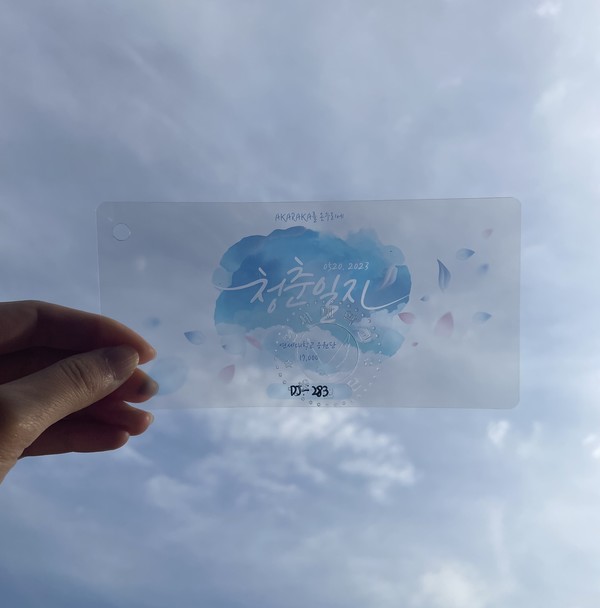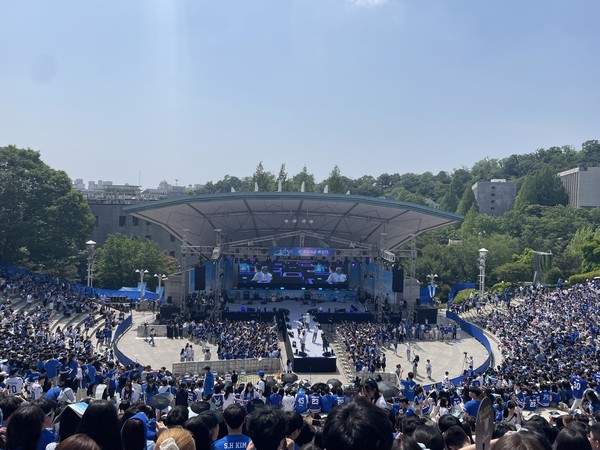Controversy surrounding the reselling of tickets

UNIVERSITY EVENTS are considered a quintessential university experience in South Korea. Yonsei University holds multiple events during the year, such as AKARAKA and the Yonsei-Korea games. However, the limited supply of tickets results in some students missing out. Instead, many students are resorting to the black market, such as resellers on the university community app “Everytime,” to get their chance to attend these events for themselves.
Events at Yonsei
Various events are held for students at Yonsei University throughout the year. Some of the more popular ones include the AKARAKA festival, Yonsei Education Broadcasting Station’s (YBS) Soop Sok Ae Hyang Yeon[1] event, and the Yonsei-Korea games. There is limited seating available for spectators at these events and students are required to reserve tickets in order to attend. However, the competition for these tickets is incredibly high for multiple reasons. For one, going to these events is romanticized by students and missing out would be forgoing an essential university experience. Additionally, celebrities are invited to perform at some of these events—like Soop Sok Ae Hyang Yeon and AKARAKA—so students are even more eager to attend. As these events are so popular, even non-Yonsei students desire tickets.
The flaws of the ticketing system
Each festival has slightly different ticketing regulations depending on the host of the event. For AKARAKA, there are various routes through which students can get tickets—which were provided at a flat rate of ₩17,000 for this year’s event. The Yonsei University Cheer Squad operates the “university club ticketing system” for students in Yonsei’s central clubs and the “individual ticketing system” for all students currently enrolled at Yonsei—including students on leave. They also distribute any leftover tickets via a “first-come-first-serve” system. Another method is through students’ departments, which has a different eligibility criteria depending on the departments’ student councils. Departments usually implement either a first-come-first-serve or random ticketing system. Some departments enforce policies where students on leave are prohibited from applying and those who have paid the optional department fees—ggwa-bi—are given priority. Some departments are even stricter with their regulations. This year, the Department of Theology specified that “only” those who have paid the ggwa-bi—which was ₩180,000 for freshmen—were allowed to reserve tickets. In the case of the “individual ticketing” system, anyone who is currently registered as a Yonsei student is permitted to apply[2].
For the Yonsei-Korea games, tickets are only needed for the ice hockey and basketball matches which are held at out-of-school stadiums with limited seating. Since the games are organized and funded by the universities, tickets are free to Yonsei and Korea University students. Prior to the pandemic, the Yonsei-Korea games offered both department ticketing and individual ticketing systems, but the latter was eliminated for the 2022 games. Acquiring tickets for the Yonsei-Korea games, however, is less competitive than AKARAKA because of their comparatively low demand rate. The games are spread out across five matches, three of which—the baseball, rugby, and football matches—do not require tickets for entry. Accordingly, the ticketed matches are not the only way to experience the famous Yonsei-Korea games and the resell value is relatively lower than that of AKARAKA tickets. Students outside of Yonsei and Korea University are not interested in the inter-school rivalry. Consequently, the number of students vying for Yonsei-Korea games’ tickets is reduced.

An unchecked reselling phenomenon
With the high demand of tickets and the strict regulations that prohibit certain students from obtaining them, a black market inevitably arises. As long as there are students willing to pay for tickets, there will be ticket holders willing to sell. The resell price for AKARAKA tickets are the highest, with most ticket prices starting from ₩200,000. This is more than ten times the value of the original ticket. In many cases, however, tickets have been resold for over ₩300,000. As the demand for the Yonsei-Korea games and Soop Sok Ae Hyang Yeon tickets are not as high, their resell prices are only around ₩30,000 to ₩40,000.
In an interview with The Yonsei Annals, Hwang Su-a (Jr., School of Econ.) explained that, despite failing to secure an AKARAKA ticket, she would not be buying one from resellers due to the inflated price. Hwang commented that, since there are many people willing to buy these tickets, it is impossible for the resell ticket prices to not rise according to the demand. However, she also said that considering it is only a school festival, the high resell prices are higher than expected and creates a burden for those students who really wish to attend.
Buying or selling tickets on the black market does come with some risk as it is illegal to resell them for more than the original sale price. A couple of weeks before AKARAKA, the Yonsei University Cheer Squad reinforced their intentions to catch perpetrators and detailed that strict punishments would be applied[3]. In order to mitigate the reselling phenomenon, students have been required to prove their identity with both their identification cards and Yonsei student identification cards when claiming their tickets. In addition, department ticket distributors have been instructed to note down which student received which ticket using each ticket’s unique code. However, some students have criticized the Yonsei University Cheer Squad for insufficient action on resellers. Their precautions still do not make it completely impossible for students to resell tickets after receiving the physical tickets and entry to the festival itself does not require proof of identification. Hwang expressed that, since it is an event organized by the Yonsei University Cheer Squad, they have the responsibility to prevent resellers. Hwang also commented that, while it was reported that some tickets intended to be resold had been caught, they only make up a small portion of all of the resold tickets. Thus, Hwang believes that more rigorous identification procedures should be implemented to ensure that only those who intend to go to the festival get tickets.
Some students have pointed towards Korea University Cheerleaders’ ticketing guidelines as a more effective method of preventing ticket resellers. For Korea University’s own student festival IPSELENTI, tickets—in the form of bracelets—are given to spectators upon entry on the day of the event after each ticket holder’s identity is authenticated. The Korea University Cheerleaders also introduced a new practice of placing a stamp where the two ends of the ticket bracelet overlap to prevent resellers from attempting to remove and reattach tickets onto their buyers’ wrists. Furthermore, it was announced that anyone caught trying to sell or buy IPSELENTI tickets through unofficial means would be placed on a blacklist, preventing them from applying for the remaining IPSELENTI ticket draws as well as tickets for the upcoming Yonsei-Korea games[4].
The Annals contacted the Student Support Team and the Yonsei University Cheer Squad for further insight yet received no response.
* * *
University events are a time for university students to celebrate their youth and temporarily let loose of their worries. However, this festive mood can turn sour when students use this occasion as an opportunity to resell tickets—illegally—with huge profit margins. Organizers should continue their efforts to enforce strict measures that curb the unlawful reselling of tickets.
[1] Soop Sok Ae Hyang Yeon: A concert in the woods at Yonsei University
[2] Yonsei University Cheer Squad
[3] Instagram
[4] Korea University Cheerleaders

